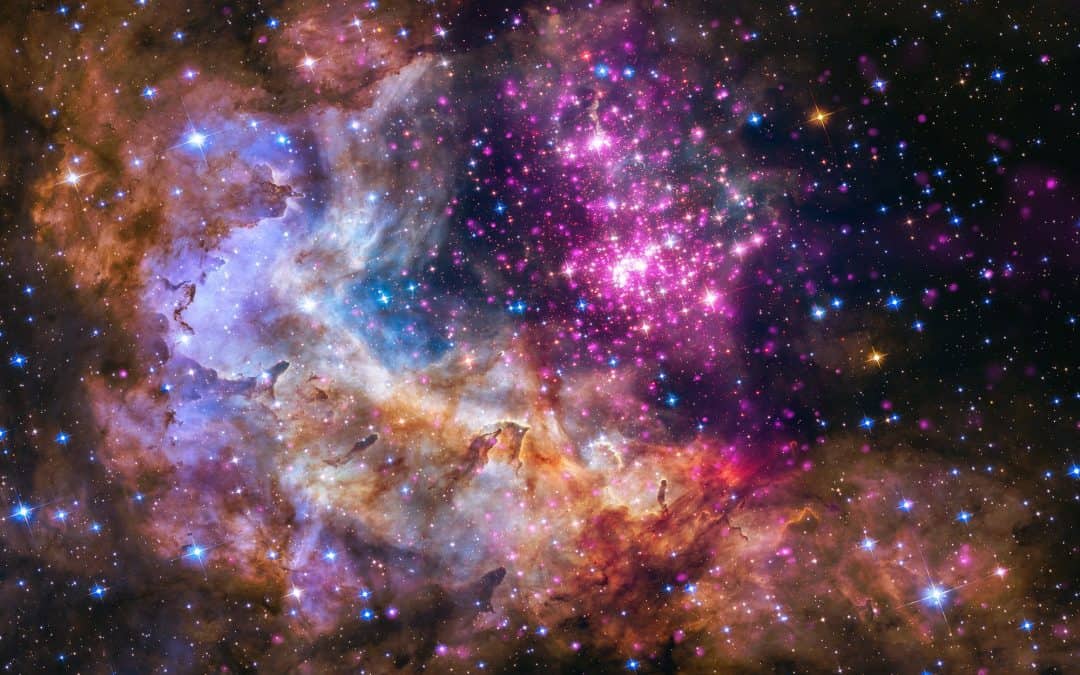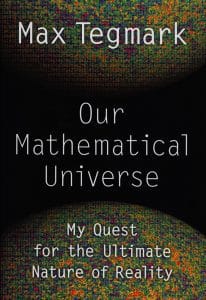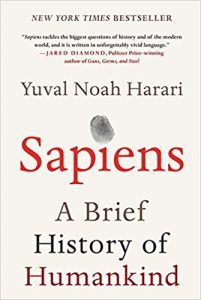9 Mind-Expanding Books on Science, Humanity, and the Universe
A common comment I receive from SAT and ACT prep students goes like this: “I’m more of a science and math person, so I’m not very good at the Reading section.” I’m always sad when I hear a statement like this. Why? Because the disciplines of science and math have contributed an untold amount to human flourishing, but without the ability to communicate their findings, scientists and mathematicians would never be able to build on one another’s progress and make a compelling case for the realities they describe. Any scientist or mathematician worth his or her salt knows that communication is an essential part of the spirit of scientific and mathematical inquiry. Students interested in STEM fields need to be talented readers, writers, and speakers if they hope to attain success and recognition for their work. Without reading and processing the work of those who’ve come before them, without being able to properly articulate their research aims, methods, and findings, and without being able to sell themselves in job interviews, would-be scientists might find that it’s difficult to move forward on their chosen career path. And if students interested in science and math don’t sharpen their verbal skills, they might have a tough time getting into college in the first place, or getting into a top-tier program in their field. With all these considerations in mind, then, and with the added consideration that science and math are fascinating subjects for ALL students, not just students shooting for careers in STEM, I’ve created this list of 9 books students who love science and math might enjoy. The incredible thing about humanity, though, is that I was able to come up with this list off the top of my head, as these are all books that I’ve read this past year. There are hundreds of thousands of worthy texts out there, so science and math students (and ALL students) should stop telling themselves that a passion for science and math precludes a passion for reading! Here are some points of departure…
Our Mathematical Universe, by Max Tegmark
Max Tegmark first came to my attention on neuroscientist, philosopher, and bestselling author Sam Harris’s podcast, Waking Up. In the episodes I listened to, “The Multiverse & You (& You and You & You” and “The Future of Intelligence,” I found Tegmark to be a brilliant thinker and eloquent exponent of some of the most interesting and promising theories in math and science. Tegmark is an MIT professor, physicist, and cosmologist, and the co-founder of the Future of Life institute. He has made numerous television appearances and has been interviewed by many major media outlets for his work on probing the nature of the universe and contemplating the future of humanity, including challenges humanity might face in the age of artificial intelligence. A great place to start if you’re interested in Tegmark’s ideas is Our Mathematical Universe. In this text, Tegmark argues that physical reality not only can be described by mathematics, but that physical reality IS mathematics. Exciting stuff, isn’t it? Check it out for yourself, or watch a YouTube lecture or listen to a podcast with Tegmark to see if you find his ideas compelling before grabbing one of his admittedly difficult books.
Superintelligence, by Nick Bostrom
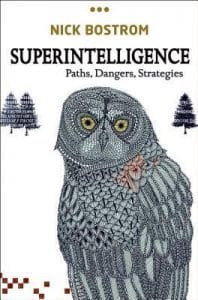 Nick Bostrom is a philosopher at Oxford University and his work should be of particular interest for people who enjoy learning about science and math. Bostrom’s ideas first came to my attention when I read his paper on his now-classic simulation hypothesis, a text that makes the case that if intelligent life (including us) is or will become capable of creating simulations of reality, the likelihood that we are living in a simulation will be vastly higher than the likelihood that we are not living in a simulation. This is pretty mind-blowing stuff, so if you’re a fan of The Matrix, you might enjoy reading Bostrom’s paper on the simulation hypothesis. But the book I’m recommending by Bostrom is Superintelligence, which is an inquiry into humanity’s relationship, present and future, with artificial intellgience. The subtitle of Bostrom’s book is “Paths, Dangers, Strategies,” and these are precisely what Bostrom offers. A difficult but worthwhile book, Superintelligence discusses the divergent paths humanity’s work with artificial intelligence might take, alerts us to some of the potential dangers of humanity’s development of artificial intelligence technology, and offers potential advice to circumvent some of these possible challenges. If you’re at all fascinated by what humankind might look like hundreds of years into the future, Bostrom’s book will certainly be of interest to you.
Nick Bostrom is a philosopher at Oxford University and his work should be of particular interest for people who enjoy learning about science and math. Bostrom’s ideas first came to my attention when I read his paper on his now-classic simulation hypothesis, a text that makes the case that if intelligent life (including us) is or will become capable of creating simulations of reality, the likelihood that we are living in a simulation will be vastly higher than the likelihood that we are not living in a simulation. This is pretty mind-blowing stuff, so if you’re a fan of The Matrix, you might enjoy reading Bostrom’s paper on the simulation hypothesis. But the book I’m recommending by Bostrom is Superintelligence, which is an inquiry into humanity’s relationship, present and future, with artificial intellgience. The subtitle of Bostrom’s book is “Paths, Dangers, Strategies,” and these are precisely what Bostrom offers. A difficult but worthwhile book, Superintelligence discusses the divergent paths humanity’s work with artificial intelligence might take, alerts us to some of the potential dangers of humanity’s development of artificial intelligence technology, and offers potential advice to circumvent some of these possible challenges. If you’re at all fascinated by what humankind might look like hundreds of years into the future, Bostrom’s book will certainly be of interest to you.
The Fabric of the Cosmos, by Brian Greene
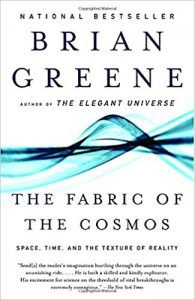 Mathematician and physicist Brian Greene, a professor at Columbia University, is a leading scientist in the mind-boggling field of string theory, often hailed as science’s most likely candidate for a so-called “Theory of Everything.” Einstein dreamed of coming up with a theory that would unify his work on gravity with work on electromagnetism, but he died before being able to accomplish this task. The discovery of quantum mechanics eclipsed Einstein’s work on general relativity and revealed that on the subatomic level, the universe behaves much, much differently than it behaves on the macro-level. Things are orderly and predictable on the macro-level, and relativity gives us a reliable way to understand large objects in space. However, on the quantum level, chance, randomness, and uncertainty rule. One way physicists have tried to make sense of this situation is with the field of string theory, which posits that everything is made up of infinitesimally tiny vibrating “strings” of energy. It’s brain-bending stuff, but Greene is a brilliant writer in addition to being a brilliant thinker. His books are all incredible, but the best book to begin with might be The Fabric of the Cosmos. If theoretical physics, string theory, and the nature of the universe fascinate you, check out The Fabric of the Cosmos. If you’d like an easier-to-digest introduction to string theory, PBS Nova has a free documentary online based on Greene’s first book, The Elegant Universe. It’s a three-part series that offers an easy-to-digest primer on the string theory. There’s also one based on The Fabric of the Cosmos. Still, these shows are no substitute for actually reading Greene’s books!
Mathematician and physicist Brian Greene, a professor at Columbia University, is a leading scientist in the mind-boggling field of string theory, often hailed as science’s most likely candidate for a so-called “Theory of Everything.” Einstein dreamed of coming up with a theory that would unify his work on gravity with work on electromagnetism, but he died before being able to accomplish this task. The discovery of quantum mechanics eclipsed Einstein’s work on general relativity and revealed that on the subatomic level, the universe behaves much, much differently than it behaves on the macro-level. Things are orderly and predictable on the macro-level, and relativity gives us a reliable way to understand large objects in space. However, on the quantum level, chance, randomness, and uncertainty rule. One way physicists have tried to make sense of this situation is with the field of string theory, which posits that everything is made up of infinitesimally tiny vibrating “strings” of energy. It’s brain-bending stuff, but Greene is a brilliant writer in addition to being a brilliant thinker. His books are all incredible, but the best book to begin with might be The Fabric of the Cosmos. If theoretical physics, string theory, and the nature of the universe fascinate you, check out The Fabric of the Cosmos. If you’d like an easier-to-digest introduction to string theory, PBS Nova has a free documentary online based on Greene’s first book, The Elegant Universe. It’s a three-part series that offers an easy-to-digest primer on the string theory. There’s also one based on The Fabric of the Cosmos. Still, these shows are no substitute for actually reading Greene’s books!
Hyperspace, by Michio Kaku
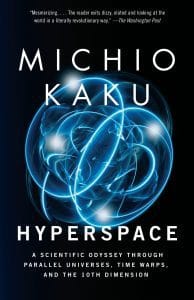 Michio Kaku is another great example of a brilliant scientist who knows how to write. A professor of theoretical physics at CUNY, Kaku has also written several popular science books which are equally fascinating for specialists and the general public alike. He’s also hosted many different specials for the BBC, the Discovery Channel, and the History Channel. Although it’s not his newest book, a great introduction to his ideas is Hyperspace: A Scientific Odyssey through Parallel Universes, Time Warps, and the Tenth Dimension. So many of the ideas in Kaku’s book feel like science fiction, but Kaku does an expert job of explaining exactly how and why mathematics lend credence to the various arguments of string theorists. Kaku’s newest book, published in 2018, is The Future of Humanity: Terraforming Mars, Interstellar Travel, Immortality, and Our Destiny Beyond Earth is also a great introduction to some of Kaku’s futurist ideas. It’s less about string theory and more about possible paths humanity might take, given the scientific fact that our planet will not be hospitable to human life (or, indeed, exist) forever. Kaku lays out the different options, as he sees them, for progress within our solar system and beyond it. Toward the end of the book, he even speculates about the possibility of entering another universe. Such topics might strike the average person as completely bizarre, but most of what science has discovered would seem completely bizarre to a human being from a hundred years ago! Whether or not his ideas pan out, Kaku’s work is sure to get you thinking about our place in the cosmos.
Michio Kaku is another great example of a brilliant scientist who knows how to write. A professor of theoretical physics at CUNY, Kaku has also written several popular science books which are equally fascinating for specialists and the general public alike. He’s also hosted many different specials for the BBC, the Discovery Channel, and the History Channel. Although it’s not his newest book, a great introduction to his ideas is Hyperspace: A Scientific Odyssey through Parallel Universes, Time Warps, and the Tenth Dimension. So many of the ideas in Kaku’s book feel like science fiction, but Kaku does an expert job of explaining exactly how and why mathematics lend credence to the various arguments of string theorists. Kaku’s newest book, published in 2018, is The Future of Humanity: Terraforming Mars, Interstellar Travel, Immortality, and Our Destiny Beyond Earth is also a great introduction to some of Kaku’s futurist ideas. It’s less about string theory and more about possible paths humanity might take, given the scientific fact that our planet will not be hospitable to human life (or, indeed, exist) forever. Kaku lays out the different options, as he sees them, for progress within our solar system and beyond it. Toward the end of the book, he even speculates about the possibility of entering another universe. Such topics might strike the average person as completely bizarre, but most of what science has discovered would seem completely bizarre to a human being from a hundred years ago! Whether or not his ideas pan out, Kaku’s work is sure to get you thinking about our place in the cosmos.
Sapiens: A Brief History of Humankind, by Yuval Noah Harari
Harari is a relatively young historian, but his two books, Sapiens and Homo Deus have launched what will likely prove to be an incredible career; both books have become New York Times bestsellers. A large part of Harari’s success lies in the fact that Harari is able to craft a compelling narrative from a massively ambitious topic: writing about the history of humankind from our earliest beginnings to our possible future. Sapiens traces the journey of human evolution in an easily-digestible fashion, touching on the great revolutions, such as the cognitive revolution and the industrial revolution, that have made human advancement possible. Although he’s technically a historian, Harari is clearly fascinated by science and well-versed in the scientific literature, and he uses science to inform his view of humanity’s past, present, and future. For a riveting take on where we’ve come from and where we’re headed, I can’t recommend Harari’s books highly enough!
Contact, by Carl Sagan
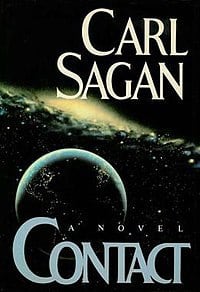 I remember watching the movie Contact when I was young and being absolutely fascinated. The film stars Jodie Foster and Matthew McConnaughey and is based on an even better novel by Carl Sagan. Sagan was a cosmologist, astrophysicist, and popularizer of science as well as a professor at Cornell University and the creator of the original Cosmos television series, based on his book of the same name, which offers a history of the cosmos. Neil Degrasse Tyson was heavily influenced by Sagan’s work (and went on to host the rebooted Cosmos series in recent years). Although Contact is a novel and the only work of strict fiction on this list, it is informed by Sagan’s vast wealth of knowledge and experience in the Search for Extraterrestial Intelligence (or SETI). Sagan imagines what contact with alien life might hold for humanity in this page-turner of a novel, and I highly recommend it if you’re in the mood for some science fiction. Sagan’s nonfiction books (such as Cosmos and Pale Blue Dot) are all classics as well, so do yourself a favor and spend some time with this legendary scientist’s ideas.
I remember watching the movie Contact when I was young and being absolutely fascinated. The film stars Jodie Foster and Matthew McConnaughey and is based on an even better novel by Carl Sagan. Sagan was a cosmologist, astrophysicist, and popularizer of science as well as a professor at Cornell University and the creator of the original Cosmos television series, based on his book of the same name, which offers a history of the cosmos. Neil Degrasse Tyson was heavily influenced by Sagan’s work (and went on to host the rebooted Cosmos series in recent years). Although Contact is a novel and the only work of strict fiction on this list, it is informed by Sagan’s vast wealth of knowledge and experience in the Search for Extraterrestial Intelligence (or SETI). Sagan imagines what contact with alien life might hold for humanity in this page-turner of a novel, and I highly recommend it if you’re in the mood for some science fiction. Sagan’s nonfiction books (such as Cosmos and Pale Blue Dot) are all classics as well, so do yourself a favor and spend some time with this legendary scientist’s ideas.
A Brief History of Time, by Stephen Hawking
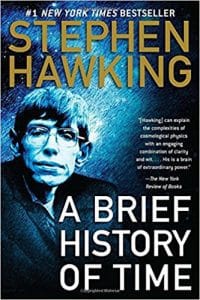 One of the greatest scientists of all time (whose personal story is as inspiring as his work as a scientist) is Stephen Hawking. A slim text of Hawking’s called A Brief History of Time: from the Big Bang to Black Holes, is a great read for anyone who wants to explore astronomy, physics, space, time, and black holes. Hawking also touches on humanity’s quest for a so-called “Theory of Everything,” which would provide a complete picture of the physical reality of the universe, uniting general relativity and quantum mechanics. People interested and science and math should take the time to familiarize themselves with Hawking’s story and his mind-opening work as a scientist. You’ll find it difficult not to be inspired and amazed by what you uncover when you delve into his work.
One of the greatest scientists of all time (whose personal story is as inspiring as his work as a scientist) is Stephen Hawking. A slim text of Hawking’s called A Brief History of Time: from the Big Bang to Black Holes, is a great read for anyone who wants to explore astronomy, physics, space, time, and black holes. Hawking also touches on humanity’s quest for a so-called “Theory of Everything,” which would provide a complete picture of the physical reality of the universe, uniting general relativity and quantum mechanics. People interested and science and math should take the time to familiarize themselves with Hawking’s story and his mind-opening work as a scientist. You’ll find it difficult not to be inspired and amazed by what you uncover when you delve into his work.
A Short History of Nearly Everything, by Bill Bryson
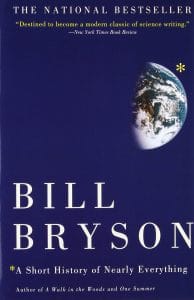 I particularly enjoy this book by Bill Bryson because of its massive scope. Bryson writes in an entertaining way on a great number of different topics in science, from geology to chemistry to cosmology and beyound. You learn so many random facts and gain a surprisingly broad (and deep) knowledge of humanity’s pursuit of science, from its earliest beginnings to its possible future. It’s probably the easiest read on this list, too, and it covers the greatest range of topics. For these reasons, I highly recommend A Short History of Nearly Everything. It left me with no shortage of topics for further investigation, and it’s written in such a way that even a person with no interest in science might find it interesting. In fact, Bryson notes near the beginning of the book that he never used to enjoy science because he had written it off as boring. He takes special care to ensure that his own book is never boring, and as it went on to become a bestseller, he clearly succeeded in doing so.
I particularly enjoy this book by Bill Bryson because of its massive scope. Bryson writes in an entertaining way on a great number of different topics in science, from geology to chemistry to cosmology and beyound. You learn so many random facts and gain a surprisingly broad (and deep) knowledge of humanity’s pursuit of science, from its earliest beginnings to its possible future. It’s probably the easiest read on this list, too, and it covers the greatest range of topics. For these reasons, I highly recommend A Short History of Nearly Everything. It left me with no shortage of topics for further investigation, and it’s written in such a way that even a person with no interest in science might find it interesting. In fact, Bryson notes near the beginning of the book that he never used to enjoy science because he had written it off as boring. He takes special care to ensure that his own book is never boring, and as it went on to become a bestseller, he clearly succeeded in doing so.
The Blank Slate, by Steven Pinker
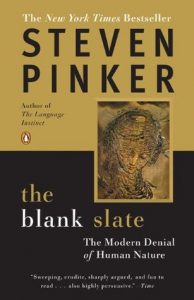 This is a classic book by cognitive psychologist and linguist Steven Pinker, an author whose work I heartily recommend. His latest book, Enlightenment Now, is also highly enjoyable—it makes a case for continued investment in the ideals of the Enlightenment, reason, science, and uses data (a ton of data, charts and graphs) to show just how much better off humanity is now than we were in previous decades and centuries. It’s a great antidote to much of the gloom-and-doom rhetoric we’re used to hearing these days, and a reminder that the so-called “Golden Age” (whatever that age might be) isn’t quite golden when compared to the comparatively great progress and prosperity humanity enjoys today. The Blank Slate, though, is a classic for a reason. It’s a scientific takedown of the tabula rasa (or “blank slate”) theory of consciousness, which posits (incorrectly, as Pinker demonstrates) that the mind has no innate traits, that humans are “blank slates” when they come into the world. In addition to disproving the blank slate model of consciousness, Pinker also attacks the Romantic notion of the “noble savage” and the idea of the “ghost in the machine.” In debunking notions such as these which still hold large popular sway, Pinker lends credence to the findings of science in the face of science-deniers, whose irrational fears have social consequences that Pinker explores in depth as well. I highly recommend The Blank Slate and all of Pinker’s books.
This is a classic book by cognitive psychologist and linguist Steven Pinker, an author whose work I heartily recommend. His latest book, Enlightenment Now, is also highly enjoyable—it makes a case for continued investment in the ideals of the Enlightenment, reason, science, and uses data (a ton of data, charts and graphs) to show just how much better off humanity is now than we were in previous decades and centuries. It’s a great antidote to much of the gloom-and-doom rhetoric we’re used to hearing these days, and a reminder that the so-called “Golden Age” (whatever that age might be) isn’t quite golden when compared to the comparatively great progress and prosperity humanity enjoys today. The Blank Slate, though, is a classic for a reason. It’s a scientific takedown of the tabula rasa (or “blank slate”) theory of consciousness, which posits (incorrectly, as Pinker demonstrates) that the mind has no innate traits, that humans are “blank slates” when they come into the world. In addition to disproving the blank slate model of consciousness, Pinker also attacks the Romantic notion of the “noble savage” and the idea of the “ghost in the machine.” In debunking notions such as these which still hold large popular sway, Pinker lends credence to the findings of science in the face of science-deniers, whose irrational fears have social consequences that Pinker explores in depth as well. I highly recommend The Blank Slate and all of Pinker’s books.
Final thoughts
Hopefully this list has provided you some ideas for books to read if you’re interested in science! Remember that this list consists of books I personally have read and enjoyed, and that there’s no way I could do the great fields of science and math justice in one little blog post. There are thousands of incredible authors and thinkers whose work I could include in this post, so get out there and find them for yourself! Reading is THE best way to educate yourself, and educating yourself will give you THE best shot at the SAT, ACT, college admissions, and (ultimately) a productive and meaningful existence.
Let us know some of your favorite science books in the comments!
* * *
That’s it! For more reading recommendations, as well as a wealth of SAT and ACT prep tips (plus tons of great college admissions advice), check out the rest of our blog. Looking for 1-on-1 ACT or SAT prep tutoring? Want to join an SAT or ACT group class? Contact us today!
